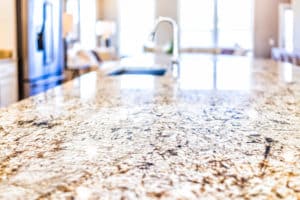The decision between quartz and laminate countertops for your kitchen or bathroom can be difficult. Each material has particular benefits and things to keep in mind. To assist you in making an informed choice for your house, this guide will examine the benefits and drawbacks of laminate and quartz countertops.
Quartz Countertops: Pros and Cons
Pros of Quartz Countertops
Quartz worktops are distinguished by their exceptional strength and visual appeal. These extremely durable quartz countertops, which are engineered from a blend of natural quartz crystals and resins, are ideal for high-traffic areas like kitchens and bathrooms because they are resistant to stains, chipping, and scratches. Because quartz’s surface is non-porous and resistant to mold and bacteria, it doesn’t need to be sealed, making maintenance easier and fostering a hygienic atmosphere. In addition, quartz comes in a broad range of hues and finishes to complement any design and has a modern, sophisticated appearance with a constant pattern.
Additionally, this material can have the look and feel of actual stone without any of the flaws. Quartz countertops frequently increase a home’s resale value significantly, so homeowners find that the higher original cost is justified. Another important advantage is customization, since quartz can be manufactured with different edge profiles and forms to meet unique design requirements.
Cons of Quartz Countertops
Quartz counters have many benefits, but they also have some disadvantages. Cost is one of the most important factors; quartz is typically more expensive than laminate and other countertop materials, which may discourage consumers on a tight budget. Another factor to take into account is the weight of the quartz, as its bulk necessitates strong support and expert installation, which could raise project expenses overall. Quartz is also susceptible to heat; although it can tolerate modest heat, direct contact with hot cookware can result in damage. To prevent this, use heat pads or trivets to shield the surface. Furthermore, while quartz has a uniform appearance, people who value the distinctive, organic veining and patterns seen in stones like granite may not find quartz to their taste.
Laminate Countertops: Pros and Cons
Pros of Quartz Countertops
Because of their popularity and affordability, laminate countertops are a popular option for renovations on a tight budget. Laminate is an affordable option that doesn’t sacrifice style. It is made of layers of plastic bonded to particleboard or kraft paper. Due to the wide range of colors, patterns, and finishes available in contemporary laminates, homeowners can attain upscale aesthetics at a fraction of the price by choosing from options that accurately replicate the look of actual stone or wood. The majority of the time, installation is simple enough to handle on your own, saving you extra money on hiring help. The lightweight nature of laminate makes handling and installation easier, which further lowers the material’s cost. Because laminate surfaces are stain-resistant and simply need to be cleaned occasionally with gentle household cleansers, maintenance is quite simple.
Cons of Quartz Countertops
However, the endurance and durability of laminate countertops are limited. Laminated surfaces are more prone to scratches, dents, and burns than quartz surfaces, despite being stain-resistant and easily cleaned. Significant damage that is frequently irreversible without replacing portions of the countertop can be caused by sharp items and hot cookware. The moisture sensitivity of laminate, particularly at joints and edges, is another drawback. Should water seep into the core material, this might result in swelling and warping. Laminate is a less desirable option for long-term durability because it often has a lower lifespan than quartz and may exhibit wear and tear earlier. Although it is less expensive initially, over time its cost-effectiveness may decrease due to the likelihood of replacement or maintenance needs.
Lastly, although laminate can have an attractive appearance, it usually doesn’t increase a home’s market value as much as quartz or other high-end materials.
Conclusion
In conclusion, quartz countertops are perfect for homeowners looking for a long-lasting and sophisticated option despite a greater upfront cost since they provide outstanding durability, minimal maintenance, and a high-end appearance. Conversely, laminate worktops offer a cost-effective and adaptable solution that is simple to install and offers a wide variety of design options. However, their durability is limited, and they may need to be repaired or replaced more frequently. Think about your taste in style, your budget, and the amount of wear and tear your countertop will see in your house when deciding between quartz and laminate.




